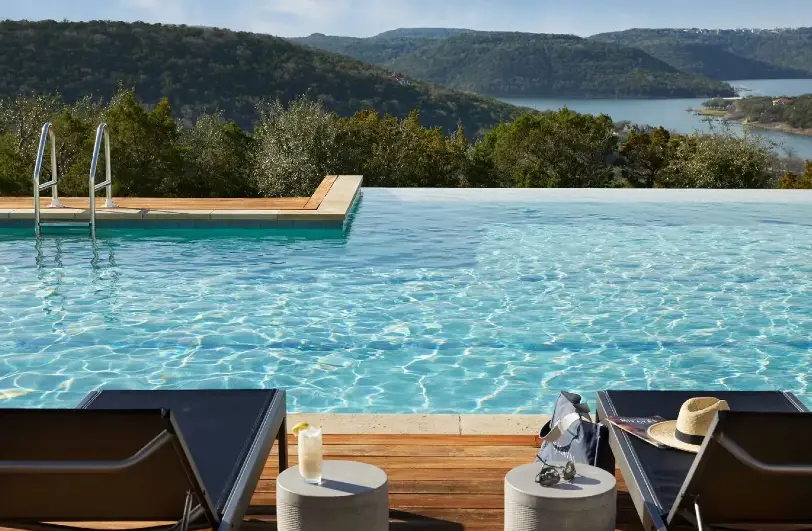Have you ever stayed at an impressive resort that, while teeming with the promise of pristine pools and soothing hot tubs, seems to be a bit lacking in any actual partakers? The offerings, sure, are plentiful, but the sauna and steam room in their world-class spa? Empty. This may sound problematic for their business, but in the efficiency-driven, “as-a-Service” economy we live in today, it also presents a smart opportunity for mutually beneficial partnership. Enter ResortPass, a service poised to connect locals and day trippers seeking relaxation with access to a partnering property’s all too available amenities.
Some might say the company has taken a page out of the Airbnb book by leveraging the under-utilized assets at resorts and selling them as an experience, for a fee. Well, the model is certainly working out for both parties. Launched in 2016—with Gwyneth Paltrow, Jessica Alba and “The Point’s Guy,” Brian Kelly, as early investors—ResortPass is starting to hit their stride this year. Not only have they grown their network significantly, but they also closed a $26 million “B” round this past November. They now partner with over 900 hotels and resorts around the world, all allowing users to enjoy luxury experiences on a day pass basis.
The price, you might be musing, is surely where the catch lies. Not necessarily, as it is more so reflective of the level of service and amenities offered, as well as the brand. The Four Seasons, for example, will likely cost you more than a Marriot. The range might be from $25-100 per day for a standard pass—more for daybeds and cabanas. The cost for children is less, if not free, depending on age.

It’s early days yet and hard to forecast the level of overall demand there will be for ResortPass, but I do have one prediction. The “stickiness” of this service will ultimately reside more with travelers than locals. According to Michael Wolf, CEO of ResortPass, the early data disagrees. So far, the majority of ResortPass’s users are locals who want to experience the amenities of hotels in their own or nearby cities. A staycation, or even “day”cation, as they say.
“Our local users never had the opportunity to access the hospitality industry locally,” says Wolf. “They thought they had to get on a plane to enjoy those sorts of amenities.”


To be fair, ResortPass does acknowledge all types of users, from locals to cruise ship passengers alike, and I’m sure they are targeting all sorts of people in various situations where the service would be compelling. Whether the local demographic remains their top revenue source is anyone’s guess, but I would wager that the true value of this service lies with a certain type of traveler staying at a certain type of place.
For example, guests staying at a boutique hotel—one that offers a terrific experience but without resort-level amenities—would seem to be likely customers. Vacationers staying with friends are another plausible group to appeal to, as they might still want a bit of pampering and that vacation vibe while they’re out of town. And then there is their ultimate customer, the ones where the value of ResortPass truly becomes apparent—and for me, it’s full circle back to Airbnb and its guests.
I love Airbnb. I don’t know anyone who doesn’t appreciate the service. They created a whole new segment of lodging at price-points that are generally more attractive than hotels, especially if you require multiple bedrooms. What Airbnb sorely lacks, however, is amenities. Sure, you can get a great pad with a pool, large kitchen and epic view of the ocean or mountains, but you cannot get the kind of facilities and social intangibles that luxury hotels and resorts offer. There is no way to spell a bustling hotel lobby, or expansive pools surrounded by chaises and cabanas, with dining and cocktail service at your fingertips.


And therein lies the true value of ResortPass. The best products and services are the ones that fill a void. It’s fine to build a better mouse trap and plenty of companies have made a living doing this. Even the most innovative companies in the world owe a lot of their success to products and services that already existed which they simply improved upon. Apple didn’t invent the smart phone; they just made it better. A lot better. But filling a void is the ultimate goal for most entrepreneurs. See Uber, Venmo and yes, Airbnb.
I think Airbnb would be wise to partner with—or dare I say, even purchase—ResortPass. It may start out as just an incremental supplement to their service, as it’s only useful if there is a qualifying resort nearby. Nonetheless, it would be a natural fit that could yield larger, more impactful results in the future. The Batman and Robin of travel disruptors, if you will.
ResortPass gets the GLR stamp of approval as a rising star in the resort space. Mark my words, they’re going places—and not just for the day.



